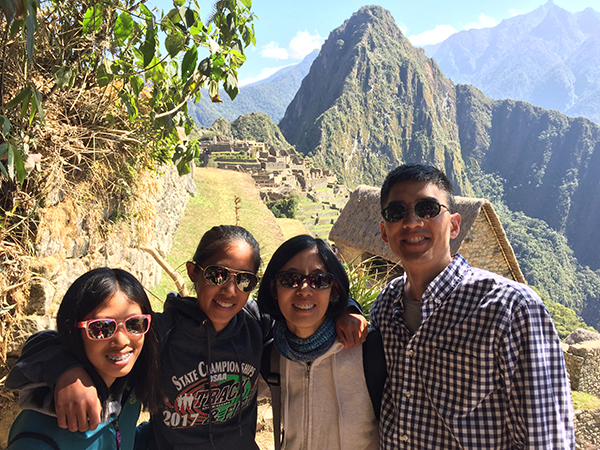
Dr. Chiang (far right) and his family on vacation visiting Machu Picchu in Peru.
The Asian American Government Executives Network (AAGEN) and the Office of Equity, Diversity, and Inclusion extend a warm and enthusiastic welcome to Dr. Michael F. Chiang, the new director of the National Institutes of Health’s (NIH) National Eye Institute (NEI). We are thrilled to have a brilliant and forward-thinking clinician, researcher, and educator leading the way in pursuit of excellence at NEI and NIH.
For me, Dr. Chiang’s appointment is incredibly meaningful to the community from which I identify. His appointment also directly addresses the issue of the underrepresentation of Asian American, Native Hawaiians and Pacific Islanders in the federal government’s Senior Executive Service (SES). NIH is extremely fortunate for the partnership with AAGEN and their assistance in ensuring widespread and inclusive access to these types of recruitment opportunities. Dr. Vivian Chen, Chair, AAGEN, and Director of Emergency Medical Services at the USDA Forest Service, states, “Our goal is to identify ways to foster the recruitment, career development, and advancement of AAPIs in the federal government and we hope to continue promoting more AAPIs into leadership positions within the government.” She continues to emphasize, “The importance of visible role models for the next generation cannot be understated, and we now have a distinct advantage in seeing individuals like Dr. Chiang as a role model in action.”
I had the privilege to video chat with Dr. Chiang not too long ago, and we touched on his fundamental concepts of leadership and how it is embodied in his perspectives and work that seem valuable to all members of the NIH and AAGEN communities. These concepts are:
- Help others thrive through mentorship. Dr. Chiang shared, "In my career and life, I have been very fortunate to have amazing mentors at each step. They pushed me to think harder (or differently), advocated for me even when I didn’t know enough to ask, and are still people I lean on. Now, I believe it’s important to prioritize mentoring others because I know how valuable it can be – for both the mentor and the mentee."
- Delegate, collaborate, and create an environment where others thrive. A fast-paced work environment is the norm for many of us; however, Dr. Chiang suggests the ability to delegate is important. He offered, "Earlier in my career, when there were fewer projects on my plate, I could take on the entire breadth and depth of the project – even if it often meant busy work weeks. As I’ve become involved in more projects, I have learned (sometimes the hard way) that delegation, collaboration, and understanding what people need to get their work done is crucial to promoting the success of those I work with."
- Facilitate the success of others. One of the key points Dr. Chiang brought up during our conversation was developing a mindset that intentionally highlights and focuses on the accomplishments of others. He stressed the importance of giving others what they need to do great things. In his words, Dr. Chiang stated, "Earlier in my career, as is often the case for those in academics, the focus was on, ‘What have I accomplished, what papers have I written and published?’ As time has progressed, my priorities have shifted to becoming that conduit for others to be successful in their work, responsibilities, and research. I now ask myself, ‘What can I do so others can be great?’”
These bits of wisdom are beneficial for each of us as we strive to create inclusive work environments where all people thrive and are able to find success.
You can learn more about Dr. Michael Chiang and the AAGEN’s SES Development Program and Leadership Workshop on their respective websites.
Do you have a story idea for us? Do you want to submit a guest blog? If it's about equity, diversity, or inclusion, please submit to edi.stories@nih.gov.
For news, updates, and videos, follow or subscribe to EDI on: Twitter, Instagram, Blog, YouTube.






